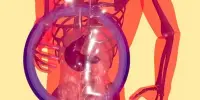Preterm babies may not habituate to repeated pain as well as full-term babies do. This is because their nervous system is not yet fully developed, and they may have an increased sensitivity to pain. Habituation is the process by which the brain learns to tune out repetitive stimuli that are not important or relevant. In the case of pain, habituation helps to reduce the perception of pain over time. Full-term babies are better able to habituate to repeated pain because their nervous system is more mature and better able to process sensory information.
A study led by UCL (University College London) researchers discovered that preterm infants do not become accustomed to repeated pain in the same way that full-term infants, children, and adults do. According to the authors of the new Current Biology paper, if preterm infants have not yet developed the mechanism that allows people to become accustomed to moderate pain, medical procedures in their first few weeks of life may have an impact on their development.
“The way we can get used to things can be seen as the simplest example of behavioral and brain plasticity, and it is a basic part of memory and learning,” said lead author Dr. Lorenzo Fabrizi (UCL Neuroscience, Physiology, and Pharmacology). Pain habituation is important because it enables us to preserve physical, emotional, and cognitive resources by not overreacting to pain that is unavoidable or not life-threatening.
“Our findings suggest that the ability to get used to repeated pain might develop during the third trimester of pregnancy, so that babies born prematurely have not yet developed this ability that full-term babies have right from birth.”
Our findings suggest that the ability to get used to repeated pain might develop during the third trimester of pregnancy, so that babies born prematurely have not yet developed this ability that full-term babies have right from birth.
Dr. Lorenzo Fabrizi
The study involved 20 infants at University College London Hospitals (UCLH) (UCLH). Half were preterm (and tested while still less than 35 weeks gestational age*), while the other half were either full term (seven infants) or preterm but tested at term age (three infants). In terms of actual postnatal age, the two groups were comparable, with preterm babies having a median age of 14 days compared to 10 days for the full-term (or term age) group.
The researchers were assessing the infants’ reactions to a painful but clinically necessary heel lance (blood test), which was administered twice (three to 18 minutes apart) to each infant (two lances are sometimes required to collect enough blood; this is not needed for most infants so only those that needed a second lance were included in the study).
Infants’ pain responses to heel lances can be significant, but it was previously unknown whether this decreases with repeated lances. To better understand this, the researchers recorded the infants’ brain activity with EEG (electroencephalography) electrodes placed on the scalp, their heart rates with ECG (electrocardiography), and their facial expressions and reflexes in withdrawing the leg.

The researchers discovered that brain activity was lower immediately after the second heel lance compared to the first, indicating a habituation response, but only in full-term infants. They discovered a similar pattern in heart rate and facial expressions, as preterm infants reacted just as strongly to both heel lances, whereas full-term infants appeared to become accustomed to the pain.
According to the researchers, this habituation response could be due to full-term infants anticipating the impending pain when they receive a second heel lance, making their reaction less pronounced, or it could be due to their brains modulating their reflexive survival responses.
They add that habituation to pain might protect the full-term infants, but not those who were pre-term, from potential consequences to their development.
“While unpleasant and painful clinical procedures are necessary for many young infants, there is the potential to impact their development, such as by altered pain perception, or potentially reduced grey matter or disrupted white matter in the brain,” said first author Dr Mohammed Rupawala (UCL Neuroscience, Physiology & Pharmacology).
Dr. Judith Meek, consultant neonatologist at UCLH and co-author, stated: “This work raises awareness of premature babies’ increased vulnerability to pain. Clinicians must do everything possible to protect patients from repeated painful experiences. This should be considered a necessary component of brain-oriented newborn care.”














